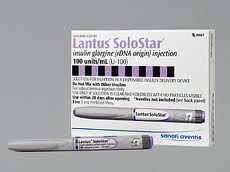 Sanofi has put off a biosimilar threat to Lantus till the end of 2016. In a patent settlement announced on Monday, the French drugmaker and U.S.-based Eli Lilly & Co. agreed to a royalty deal covering Lantus SoloStar, the injectable pen version of Sanofi's basal insulin.
Sanofi has put off a biosimilar threat to Lantus till the end of 2016. In a patent settlement announced on Monday, the French drugmaker and U.S.-based Eli Lilly & Co. agreed to a royalty deal covering Lantus SoloStar, the injectable pen version of Sanofi's basal insulin.
The settlement doesn't cover the drug as packaged in vials, Sanofi said, or any Lantus combination products. Lilly's focus has been on the pen version. And the SoloStar form accounted for 62% of Lantus (insulin glargine) sales in the U.S. last year.
Lilly ($LLY) agreed to pay royalties to Sanofi ($SNY) in exchange for a patent license. Lilly also pledged to wait to sell its pen-packaged biosimilar version of Lantus until December 15, 2016.
Lantus is Sanofi's best-selling product, with more than $7 billion in 2014 sales, so it's no surprise that the company has been fighting back against Lilly and Boehringer Ingelheim's biosimilar version. The biosimilar rolled out in the U.K. in August, with other European markets to follow. But European launches tend to be slow, so the potential damage is limited for now.
Plus, the U.S. is Lantus' biggest market, with almost two-thirds of its sales, and Sanofi went to court last year to protect it. In suing for patent infringement last January, the company triggered a 30-month stay under the Hatch-Waxman Act, which would have set the earliest date for biosims at June 2016, unless Lilly won in court in the meantime.
That means the SoloStar settlement represents a 6-month reprieve.
The extra 6 months could be important for Sanofi, which is touting its newer, long-acting basal insulin, Toujeo, as a Lantus alternative. The longer Sanofi has without a biosimilar competitor--which will necessarily be cheaper than the Lantus brand, not to mention Toujeo--the better chance it has to build up the newer drug. And now, with Novo Nordisk ($NVO) winning approval for its long-acting Tresiba, the Toujeo contest promises to heat up.
Of course, Lilly and Boehringer will have to persuade doctors that their biosimilar can slide right into Lantus' place when it comes to patient care. That's been a tricky proposition for currently marketed biosimilars such as Hospira and Celltrion's Remicade copycats--at least in some markets. Norway has gone so far as to launch its own head-to-head study pitting the brand against its biosimilar to prove to doctors that the less expensive knockoff is a ready substitute.
Biosimilar drugmakers have also discounted the products more aggressively than previously expected to win over customers. And the biosims are catching on, too; Merck & Co. ($MRK) cited the competition as one reason its Remicade sales faltered in the second quarter.
There's no way to know yet whether Lantus copies will follow in the footsteps of Remicade biosims. Lilly and Boehringer may be able to make inroads on a 15%-to-brand discount. Then again, they may take a more aggressive approach--and Sanofi may have to fight back with its own cut-rate pricing. Novo Nordisk, whose Levemir also competes in the space, could find itself contending with a price war, too. And then there's another Lantus biosimilar coming up through the pipeline from Merck and Samsung Bioepis; it's in late-stage development.
Pharma watchers and payers will be keeping a close eye on the Abasaglar-vs.-Lantus market battle as it progresses in the U.K.--and spreads across Europe--looking for hints at how Abasaglar's eventual U.S. launch might play out. Lilly and Boehringer have already scored tentative FDA approval for the product, under the Basaglar name.
- read the Sanofi release
Special Report: The top 10 patent losses of 2015 - Lantus | The 10 best-selling drugs of 2013 - Lantus